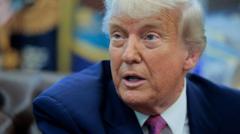The rising tariffs established by President Trump have led to an increase in trade fraud as U.S. companies are finding it easier to avoid these taxes, with reports highlighting deceptive tactics like misrepresented shipping details and routing products through lower-tariff countries.
U.S. Tariffs Encourage Fraudulent Trade Practices Among Companies

U.S. Tariffs Encourage Fraudulent Trade Practices Among Companies
U.S. manufacturers report a surge in fraudulent activities as companies seek to evade high tariffs imposed by the Trump administration, creating a complex environment for trade.
Article Text:
As President Trump's administration continues to ramp up tariffs globally, U.S. companies are facing an unforeseen side effect: a significant rise in fraudulent trade practices aimed at circumventing these fees. Manufacturers across the country say the government's efforts to ensure compliance with these tariffs are akin to playing “Whac-a-Mole,” as they struggle to combat a flood of fraudulent transactions designed to ease financial burdens.
For instance, shipping firms based in China have reportedly begun reaching out to U.S. importers, proposing strategies to bypass the hefty tariffs on various goods, including apparel and automobile components. These proposals boast of competitive rates, stating, “We can avoid high duties from China, which we have already done many in the past.” Alarmingly, some claims suggest tariffs have been eliminated altogether.
The spike in these unsolicited offers has prompted both corporate leaders and officials at U.S. Customs to express concern about the rising complexity of foreign trade compliance. Experts warn that many of these tactics — which may involve altering shipment documentation or rerouting goods through countries with more favorable tariff arrangements — constitute customs fraud.
For instance, U.S. tariffs on a $10 stuffed toy from China can reach as high as 30%, translating into a cost of $3. Conversely, similar merchandise rerouted through Vietnam declares a much lower tariff of 10%, saving firms $2 on each unit. Such practices of transshipment, where products pass through alternate nations before entering the U.S., pose challenges to customs enforcement and prompt further scrutiny of international shipping regulations.
In response to these incidences, industry leaders are calling for more robust government oversight and updated compliance measures to combat these fraudulent schemes that have proliferated in light of the new tariffs, emphasizing the urgent need for a reevaluation of current enforcement strategies and resources to effectively counteract this trend.
As President Trump's administration continues to ramp up tariffs globally, U.S. companies are facing an unforeseen side effect: a significant rise in fraudulent trade practices aimed at circumventing these fees. Manufacturers across the country say the government's efforts to ensure compliance with these tariffs are akin to playing “Whac-a-Mole,” as they struggle to combat a flood of fraudulent transactions designed to ease financial burdens.
For instance, shipping firms based in China have reportedly begun reaching out to U.S. importers, proposing strategies to bypass the hefty tariffs on various goods, including apparel and automobile components. These proposals boast of competitive rates, stating, “We can avoid high duties from China, which we have already done many in the past.” Alarmingly, some claims suggest tariffs have been eliminated altogether.
The spike in these unsolicited offers has prompted both corporate leaders and officials at U.S. Customs to express concern about the rising complexity of foreign trade compliance. Experts warn that many of these tactics — which may involve altering shipment documentation or rerouting goods through countries with more favorable tariff arrangements — constitute customs fraud.
For instance, U.S. tariffs on a $10 stuffed toy from China can reach as high as 30%, translating into a cost of $3. Conversely, similar merchandise rerouted through Vietnam declares a much lower tariff of 10%, saving firms $2 on each unit. Such practices of transshipment, where products pass through alternate nations before entering the U.S., pose challenges to customs enforcement and prompt further scrutiny of international shipping regulations.
In response to these incidences, industry leaders are calling for more robust government oversight and updated compliance measures to combat these fraudulent schemes that have proliferated in light of the new tariffs, emphasizing the urgent need for a reevaluation of current enforcement strategies and resources to effectively counteract this trend.





















